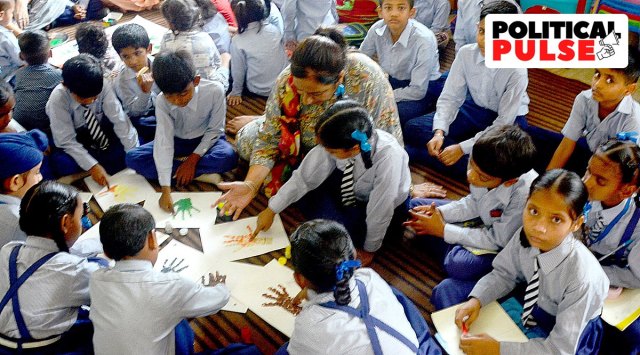The NEP, which was launched in July 2020 as an update to the previous 1986 policy, is a wide-ranging framework for education from the primary level all the way to higher education. On Wednesday, the Union Minister of Education Dharmendra Pradhan released the revised draft of the National Curriculum Framework for School Education (NCF-SE). Together, the two documents will serve as a guide for designing textbooks for classes 3 to 12 to be published by the National Council of Educational Research and Training (NCERT). These textbooks are expected to be introduced by the 2024-’25 academic session.

The NEP, however, is not binding on states, and they remain free to accept or reject the policy. Earlier this month, the Congress government in Karnataka became the first state to announce it would repeal the NEP from the next academic year, following through on one of the party’s poll promises for the Assembly elections.
Announcing the decision, Chief Minister Siddaramaiah said that NEP could only be repealed after making some necessary preparations. “There was no time for preparations this year. By the time the election results came in and the government was formed, the academic year had already started. This year, NEP will be continued as it should not cause problems to students in the middle of an academic year,” he said.
Deputy Chief Minister D K Shivakumar earlier said the Karnataka government had decided to “scrap the National Education Policy, which has been adopted by the (previous) BJP government.” “Next year, we are coming out with the new Karnataka Education Policy,” he said after a meeting at the Karnataka Pradesh Congress Committee (KPCC) office on Monday.
This decision has not gone down well with the Centre, with Union Education Minister Dharmendra Pradhan criticising the decision and urging the state not to indulge in “politics over the NEP”. “I want to tell my friend Shivakumar that your statement is mischievous and regressive. The NEP was not established in 2023 but in 2020 … envisioned by the educationists of this country. This is not a political document, it’s a philosophical document for the 21st century. What kind of message do you want to give to the youngsters of the country?” Pradhan told The Indian Express.
Kerala, too, has yet to adopt the provisions of the policy. On Wednesday, the state released supplementary textbooks that cover the portions deleted from the NCERT textbooks. Chief Minister Pinarayi Vijayan said the deleted sections should not have been removed and that the updated textbooks will “endanger our secular thinking and fraternal society.”
Story continues below this ad
Last August, the Kerala State Curriculum Committee for Higher Education released a circular piloting a “four-year undergraduate programme with a single-exit option after three years in Kerala universities.” The committee noted that its provisions are not the same as in the NEP, “which provides for multiple entry-exit options.”
Tamil Nadu is another state resisting the policy. The state government in 2021 refused to accept it, with the ruling Dravida Munnetra Kazhagam (DMK) writing to the Union Ministry of Education with its reservations. P Wilson, a DMK Rajya Sabha MP, told the BJP to “concentrate in the states where they ruled to improve the literacy rate”.
“Why do you want to dominate us, dictate a policy to states like Kerala and Tamil Nadu with higher literacy rates and development? Don’t you know that such a system will erase the importance of culture, language, linguistics and traditional diversities?” he said. In January, however, Pradhan said the Centre expects Tamil Nadu to accept the NEP. The state government’s decision to formulate a common curriculum for higher educational institutions has run into protests from academics and some universities.
As for the remaining Opposition-ruled states and Union Territories, Delhi, Bihar, Rajasthan, Telangana, Andhra Pradesh and West Bengal have either adopted the policy in parts or decided to postpone the implementation process. Telangana, for instance, hasn’t denounced the policy but has yet to begin implementing it.
Story continues below this ad
Andhra Pradesh has made significant strides in implementing the NEP, ordering a revamp of its schools as per its guidelines. Audimulapu Suresh, the state education minister from the Yuvajana Sramika Rythu Congress Party (YSRCP) government, said the state administration plans to make the most efficient use of its teachers under NEP guidelines. The Aam Aadmi Party (AAP) government in Delhi, too, has adopted the policy, with the Directorate of Education expressing its intentions to restructure school education, as per the NEP, from the next academic session.
West Bengal has asked state universities to offer four-year undergraduate programmes starting with the upcoming academic session this year, following a partial adoption of the NEP. The state, however, announced its own education policy soon afterwards, making it clear that it was not going to adopt the national policy in full. The other Opposition-rules states that have begun implementing the NEP are Rajasthan, Chhattisgarh and Himachal Pradesh.
Among the BJP-ruled states, the policy has found ready acceptance and is currently in different stages of implementation across schools and colleges. Earlier this month, Uttar Pradesh Chief Minister Yogi Adityanath held a meeting with officials of the higher education, secondary education, and basic education departments to take stock of the NEP’s implementation. Madhya Pradesh had set up a task force to chalk out a roadmap to implement the NEP the same year it was launched. Assam, Gujarat and Haryana, too, have made progress on implementation. Haryana’s Kurukshetra University became the first educational institution to implement NEP in the state.

































